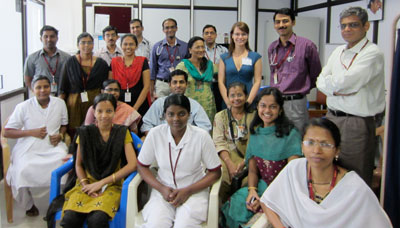The Next Generation
Pediatric Cardiac Care in Kerala, India
By Jennifer Lewey, MD, BWH/Children's Hospital Med-Peds
Residency Program
Jennifer Lewey received a
Partners HealthCare travel grant through the Partners Centers of Expertise to train for one month in Kerala, India, at the Amrita Institute of Medical
Sciences.

Jennifer Lewey and staff at the Amrita Institute of Medical Sciences. |
Walking into the hospital in the morning, I immediately begin to
feel calm. The busy hustle of patients and providers rushing to their
appointments; academic presentations of recent journal articles during morning
conference; the complex yet highly structured ways in which medical information
is communicated: these are things I know. Having arrived in India just
this week, I am grateful for these familiar rituals. For the next 4 weeks
I will be based in Kerala, the southwestern most state, at the India at the
Amrita Institute of Medical Sciences. A private hospital with over 1,000
beds, Amrita has a strong charitable program that helps to serve those who
cannot afford healthcare.
In the past week, I have had just enough time to see one cardiac
surgery, five complicated procedures in the cardiac catheterization lab, and
over 50 echocardiograms of children with incredibly complex congenital heart
disease. I have shadowed rounds in the pediatric cardiac intensive care
unit, impressed that I understand as little here as I would have in the CICU in
Boston. I have met an incredible team of attending physicians and
fellows, whose physical exam skills give me pause about what I have been
learning in my medical training for the past eight years.
Yet why travel so far when I work with some of the world's
leading experts in cardiology in Boston? The fact is that the majority of
people who have heart disease do not live in Boston. They do not live in
developed countries with functioning healthcare systems that allow access to
high-quality, sub-specialized care. They live in poor countries that
often lack access to even basic medical services. I came to India to
learn how pediatric cardiac care might be realistically delivered in poor
countries, where access to highly trained medical staff exist- but resources
are profoundly limited.
Although comforted by the daily routine of the hospital, there
is nothing routine about the practice of medicine that I am witnessing
here.
This column is written by our residents and fellows about issues
that matter to them. If you would like to submit a column to The Next
Generation, please email BWHClinicalandResearchNews@partners.org